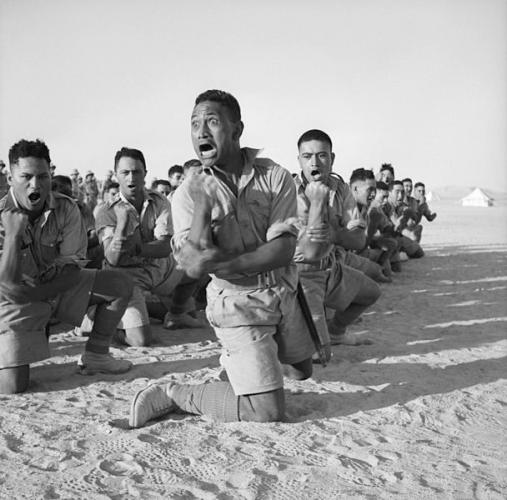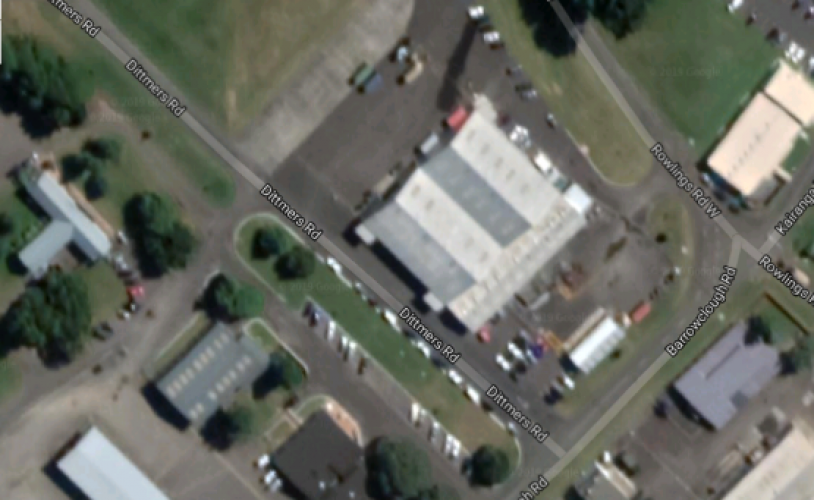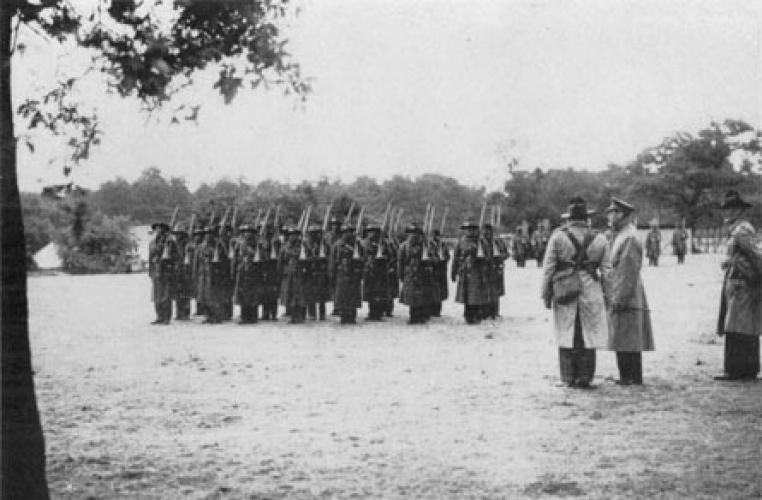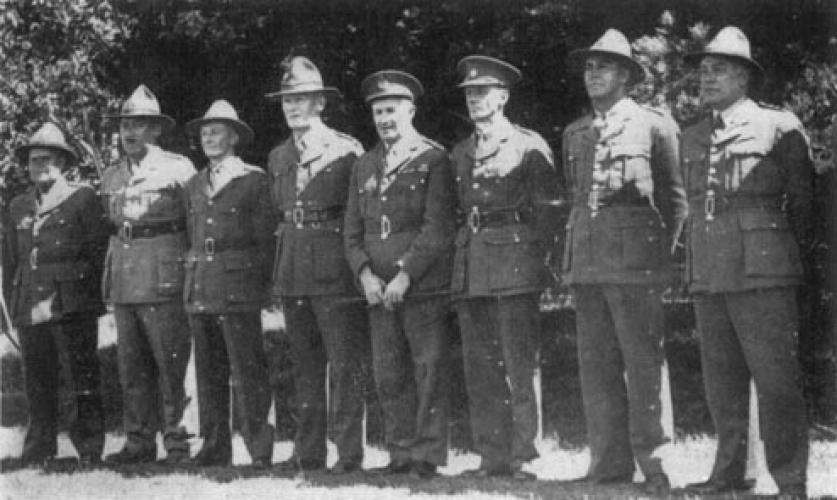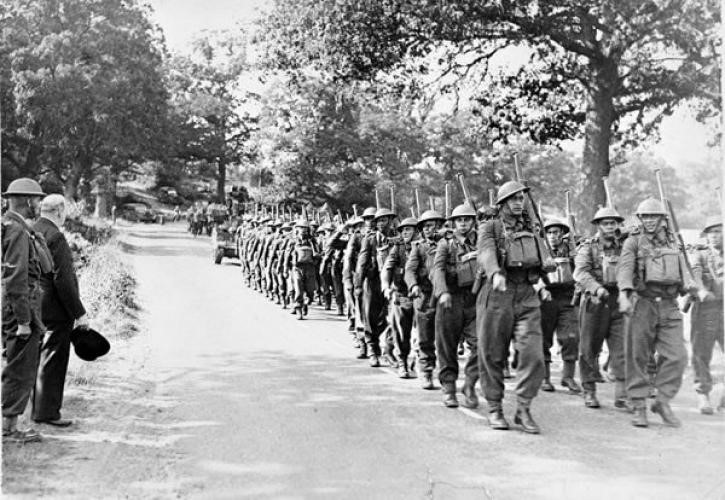256 Dittmer Rd LMC Palm Nth, aerial view 2019
Reason for the name
This street was named in honour of Brigadier George Dittmer (first Commanding Officer 28 Maori Battalion World War 2). Most streets within NZDF Camps and Bases are named in honour of prominent people, battles, campaigns, ships, aircraft and places creating a rich history of our military service.
George Dittmer was born in 893, he was the 6th child of 13 children born to August Dittmer originally from Germany and Mary King from Scotland. . He was one of the first 3 boys from Rotorua to enlist in1915. He went away as a private but after being mentioned in dispatches and receiving an MC, he was made a sergeant and by the end of WW1 he was a lieutenant colonel. During some of this time, he had his brother as a batman. One of his promotions made him the first Commanding Officer of the 28th Maori Battalion in World War 2 and by the end of his service, he was a Brigadier.
On his return from overseas from WW1, he married Leonie May Davis on Christmas Eve 1919 at St Andrews Church and they journeyed to Auckland for their honeymoon. In the Birthday Honours of June 1935 he was given an MBE. George Dittmer died in 1979.
Author: The Poppy Places Trust
He was born at Maharahara, Hawke’s Bay, on 4 June 1893. Dittmer’s career began at the age of 17 as a volunteer in D Company of the Hauraki Regiment, enlisting in the 1st Auckland Battalion at the outbreak of the First World War and sailing with the main body of the First New Zealand Expeditionary Force for Egypt with the rank of Platoon Sergeant in the Hauraki Company. Landing at Gallipoli on 25 April 1915, he served with distinction and was commissioned as a Second Lieutenant in June of that year. During the Second World War Brigadier George Dittmer commanded the 28th Māori Battalion.
After being evacuated from Gallipoli and returned to Egypt, the unit was then transferred to France in early 1916. By 1917 he had attained the rank of Captain and was awarded the Military Cross for his unwavering devotion to his unit. While serving on the Somme, Dittmer was wounded in action and evacuated to Britain for treatment. After recovering in hospital, Dittmer returned to duty in November 1917 and was appointed Major of the No 1 Entrenching Battalion, later returning to the Auckland Regiment and serving with the Army of occupation in Germany at the end of the War.
Returning to New Zealand in 1919, Dittmer was transferred to the Regular Force with the rank of Captain and held various group appointments within the Auckland District, including Officer Commanding the District School of Instruction. He was awarded the MBE in 1935.
The 28th (Māori) Battalion had its origins before the start of the Second World War. In mid-1939, as war in Europe began to be seen as inevitable, Sir Āpirana Ngata started to discuss proposals for the formation of a military unit made up of Māori volunteers similar to the Māori Pioneer Battalion that had served during the First World War. This proposal was furthered by two Māori MPs, Eruera Tirikatene and Paraire Paikea, and from this support within the Māori community for the idea began to grow as it was seen as an opportunity for Māoris to participate as citizens of the British Empire and to test their warrior skills. At first the New Zealand government was hesitant, but on 4 October, the decision was announced that the proposal would be accepted and that the battalion would be raised in addition to the nine battalions and support units that had already been formed into three brigades of the 2nd New Zealand Division.
Nevertheless, it was decided that the battalion's key positions, including its officers, non commissioned officers (NCOs) and signallers, would initially be filled largely by New Zealanders of European descent.[5] This decision was met with some consternation, so assurances were made that over time suitable Māori candidates would take over these positions. In this regard, it was decided that the battalion's first commanding officer would be a regular officer, Major George Dittmer—later promoted to lieutenant colonel in January 1940—and that his second-in-command would be a Reserve officer, Lieutenant Colonel George Bertrand, a part-Māori who would take up the position with the rank of major. Both men were veterans of the First World War and had considerable experience.
At the outbreak of the Second World War, Dittmer after being appointed Commander of the 28th Māori Battalion, was promoted to Lieutenant Colonel and was sent to England for training before embarking for the Greek theatre of war. After a fighting retreat, the Battalion was evacuated to Crete where it served with distinction against the German invasion force, earning a reputation for fierce counterattacking in the process. After a further evacuation to Egypt, Dittmer was wounded and subsequently captured whilst being treated at a New Zealand medical centre near Sidi Rezegh. Taking the initiative and using the hours of darkness to his advantage, Dittmer led an escape party of 30 soldiers some 80 miles across the desert and back to British lines on the Egyptian frontier. For his actions he was awarded the Distinguished Service Order and was mentioned in despatches.
Returning to New Zealand, Lieutenant Colonel Dittmer was appointed Commander of the 1st New Zealand Mobilised Territorial Brigade Group with the temporary rank of Brigadier. This was followed by an appointment as Commander of the 1st Mobilised Division until September 1943 when he was seconded to the Fiji Military Forces and the Second New Zealand Expeditionary Force in the Pacific as Commander. Immediately after the end of the Second World War, Dittmer was made a Commander of the Most Excellent Order of the British Empire for these services in the Pacific theatre.
In 1946, Brigadier Dittmer rejoined the New Zealand Staff Corps and was appointed Commander of the newly formed Central Military District in late 1946. He retired from the Regular Force in 1948.
Honours and Awards
Commander of the Most Excellent Order of the British Empire (CBE)
Companion of the Distinguished Service Order (DSO). The citation reads:
For gallant leadership. This officer commanded the 28th (Māori) Battalion and in both Greece and Crete rendered conspicuous service to the Division. In Greece his Battalion held a line 5000 yards in length and was attacked along the whole of its length. Despite the fact that its line was penetrated at several points the unit made a series of determined counterattacks, restored the position, and then made its withdrawal. The success was due to the leadership of Lt Col Dittmer. In the operations in Crete the 28th Battalion established a proud record. It counter attacked the enemy on at least five occasions; inflicting heavy losses each time. It took the largest share of the rear-guard work and right to the end asserted its superiority over the enemy on the ground, and in every one of its engagements was led by its commanding officer, Lt Col Dittmer." (New Zealand Gazette, 21 September 1944)
Military Cross (MC). The citation reads:
Period: 21 September 1916 to 28 February 1917. This officer left NZ as a Private. He has the best record for steady service in the Battalion, he has never been absent for a day save on duty or leave. His actions stand out vividly as an example of steady bravery in action, and daily punctual devotion to duty. After September he commanded his company at the Somme." (London Gazette, 4 June 1917, p. 5486, Rec. No. 680)
1914-1915 Star
British War Medal (1914-1920)
Victory Medal
1939-1945 Star
Africa Star
Pacific Star
Defence Medal
War Medal 1939-1945 with oak leaf
New Zealand War Service Medal
New Zealand Long and Efficient Service Medal
New Zealand Territorial Service Medal


